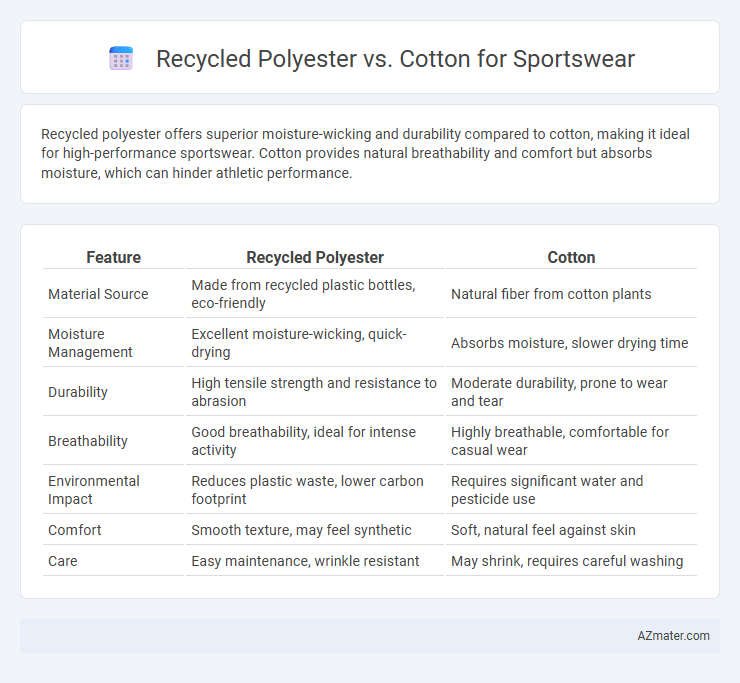Recycled polyester offers superior moisture-wicking and durability compared to cotton, making it ideal for high-performance sportswear. Cotton provides natural breathability and comfort but absorbs moisture, which can hinder athletic performance.
Table of Comparison
| Feature | Recycled Polyester | Cotton |
|---|---|---|
| Material Source | Made from recycled plastic bottles, eco-friendly | Natural fiber from cotton plants |
| Moisture Management | Excellent moisture-wicking, quick-drying | Absorbs moisture, slower drying time |
| Durability | High tensile strength and resistance to abrasion | Moderate durability, prone to wear and tear |
| Breathability | Good breathability, ideal for intense activity | Highly breathable, comfortable for casual wear |
| Environmental Impact | Reduces plastic waste, lower carbon footprint | Requires significant water and pesticide use |
| Comfort | Smooth texture, may feel synthetic | Soft, natural feel against skin |
| Care | Easy maintenance, wrinkle resistant | May shrink, requires careful washing |
Introduction to Sportswear Fabrics
Recycled polyester offers enhanced moisture-wicking properties and durability compared to traditional cotton, making it a preferred choice for high-performance sportswear. Cotton provides natural breathability and softness, ensuring comfort during low-impact activities but tends to retain moisture and dry slowly. The selection between recycled polyester and cotton depends on factors like activity intensity, sustainability goals, and fabric maintenance needs.
What is Recycled Polyester?
Recycled polyester is a sustainable fabric made from repurposed plastic waste, such as PET bottles, that reduces environmental impact by diverting materials from landfills and oceans. It offers moisture-wicking properties, durability, and quick-drying performance, making it ideal for sportswear compared to traditional cotton, which absorbs moisture and dries slower. Recycled polyester's eco-friendly production supports sustainability goals while maintaining high-performance standards demanded in athletic apparel.
Understanding Cotton in Sportswear
Cotton in sportswear offers natural breathability and moisture absorption, making it comfortable for low-impact activities. Its fibers provide softness and reduce skin irritation, but cotton tends to retain moisture longer, leading to slower drying times compared to synthetic fabrics. Despite these properties, cotton's lower durability and stretch limit its performance in high-intensity sportswear applications.
Sustainability: Recycled Polyester vs Cotton
Recycled polyester significantly reduces environmental impact by utilizing post-consumer plastic waste, lowering greenhouse gas emissions and conserving water compared to conventional cotton. Cotton cultivation requires extensive water usage and pesticides, contributing to soil degradation and pollution, whereas recycled polyester supports circular economy principles by diverting waste from landfills. Both materials offer durability, but recycled polyester's sustainability benefits highlight its growing preference in eco-conscious sportswear production.
Performance and Comfort Comparison
Recycled polyester excels in moisture-wicking, quick-drying, and durability, making it ideal for high-performance sportswear. Cotton offers superior breathability and softness, enhancing comfort but tends to retain moisture and lose shape with heavy sweating. Athletes prioritize recycled polyester for its lightweight, stretchability, and resistance to wear, while cotton remains favored for low-impact activities due to its natural fibers and comfort.
Moisture Wicking and Breathability
Recycled polyester outperforms cotton in moisture-wicking capabilities due to its hydrophobic fibers that quickly transport sweat away from the skin, keeping athletes dry and comfortable. Cotton, being a natural fiber, absorbs moisture but retains it, leading to slower drying times and potential discomfort during intense physical activity. Breathability is enhanced in recycled polyester through engineered microfibers that promote airflow, whereas cotton's dense weave can trap heat and moisture, making it less ideal for high-performance sportswear.
Durability and Longevity
Recycled polyester outperforms cotton in durability and longevity, maintaining strength and shape after numerous washes, making it ideal for high-performance sportswear. Cotton tends to wear out faster, losing elasticity and showing signs of pilling and fading with frequent use. Recycled polyester's resistance to abrasion and moisture enhances its lifespan, ensuring sustained performance in activewear applications.
Environmental Impact Analysis
Recycled polyester in sportswear significantly reduces plastic waste by repurposing PET bottles, lowering carbon emissions by up to 30% compared to virgin polyester production. Cotton, although biodegradable, requires extensive water usage--over 2,700 liters per kilogram--and heavy pesticide application, contributing to soil degradation and water pollution. Choosing recycled polyester minimizes ecological footprints by conserving resources and cutting greenhouse gas emissions in athletic apparel manufacturing.
Cost Considerations for Consumers
Recycled polyester for sportswear generally offers lower production costs due to its energy-efficient manufacturing process and availability from waste materials, resulting in competitive retail pricing compared to cotton. Cotton sportswear often involves higher costs related to water-intensive farming, pesticide use, and longer cultivation periods, which can increase consumer prices. Consumers seeking affordable, eco-friendly options may find recycled polyester sportswear more cost-effective without sacrificing performance or durability.
Choosing the Right Fabric for Your Needs
Recycled polyester offers superior moisture-wicking and quick-drying properties, making it ideal for high-intensity sports and outdoor activities, whereas cotton provides natural breathability and softness, suitable for low-impact workouts or casual wear. Performance metrics like durability, stretchability, and environmental impact should guide fabric selection, with recycled polyester excelling in sustainability by reducing plastic waste. Assessing your activity level, comfort preferences, and ecological footprint ensures the right sportswear fabric aligns with both functional and ethical requirements.

Infographic: Recycled polyester vs Cotton for Sportswear
 azmater.com
azmater.com